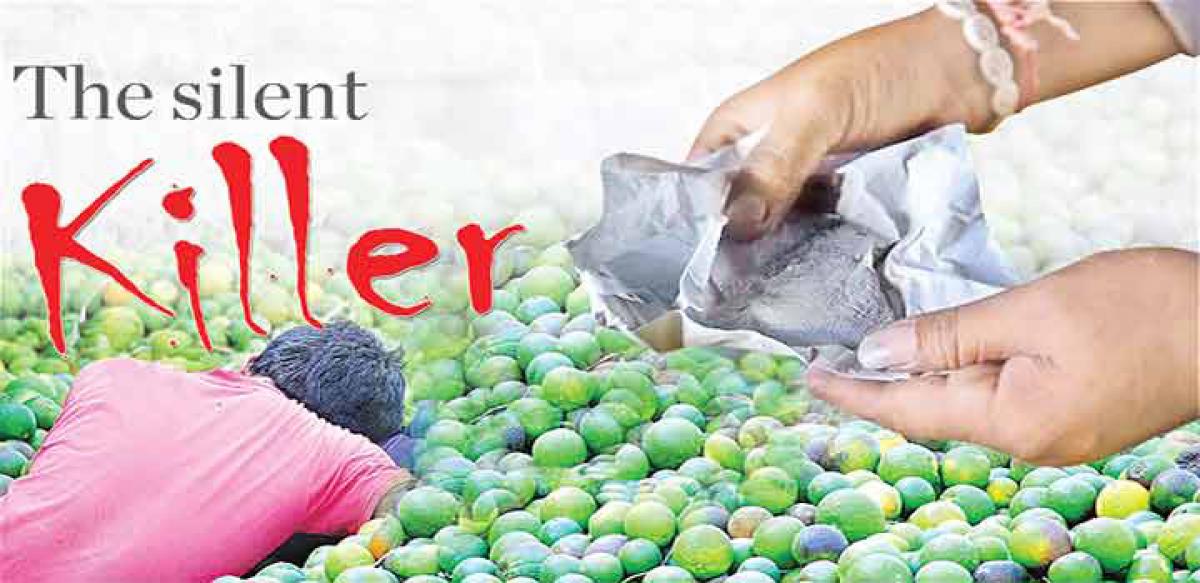Live
- 21 arrests till Monday in Bengal tablet scam: Police
- Satiwiksairaj Rankireddy and Chirag Shetty back in action in China Masters Super 750 tournament
- Congress believes in gaining power through polarisation: Naqvi on Revanth's Muslim quota remark
- Telangana Allocates Rs. 127.65 Crore for Vemulawada Rajarajeswara Temple
- Supreme Court puts on hold order requesting President to decide on Balwant Singh Rajoana’s mercy plea
- Gifts for Dad, Husband, Brother: Men’s Day Edition
- Men’s Day Gift Guide: Timeless Jewellery Pieces from & FNP & Jewelbox to Elevate His Style
- Chaos at Pushpa 2: The Rule Trailer Launch in Patna as Fans Climb Barricades, Police Use Lathi Charge
- Japan sees nationwide temperature drop
- Electronics, engineering, agricultural goods propel India's export growth: CRISIL
Just In

A division bench of the High Court has rapped recently the Telangana and Andhra Pradesh governments over its negligence to check the carbide menace and failure to take concrete steps to overcome the problem of artificial ripening of fruits with calcium carbide chemical and also failure to create awareness among the citizens about the ill-effects of consuming such fruits.
A division bench of the High Court has rapped recently the Telangana and Andhra Pradesh governments over its negligence to check the carbide menace and failure to take concrete steps to overcome the problem of artificial ripening of fruits with calcium carbide chemical and also failure to create awareness among the citizens about the ill-effects of consuming such fruits. It directed the Principal Secretaries of Agriculture and Marketing of both the States to appear in person in the court on the next day of hearing on February1.
Calling fruit traders who use carcinogen calcium carbide to ripen fruits ‘worse than terrorist’ the Bench also directed the two States to take steps for establishment of ‘ethylene chambers’ for ripening fruits by the stakeholders and for its close monitoring by the authorities to overcome the problem of availability of carbide fruits on the markets, in an earlier occasion.
Though Telangana stands third in area and eighth in production of fruits in the country, it has only three ripening chambers and five cold storages in the State as it produces around 40,79,399 tonnes of fruits every year, which constitutes 74% of total horticulture cropped area.
Following the High Court censure, the Telangana government proposed to the Centre to set up four ethylene chambers in major markets this year initially as the Centre has agreed to sanction Rs 92 lakh expenditure towards its share of 35% and the remaining 65 percent expenditure bared by Telangana.
In Telangana, Gaddiannaram fruit market is the biggest market in both Telangana and Andhra Pradesh with 97 godowns, from where hundreds of fruit companies do business. The Telangana government has also decided to set up five big cold storages in major markets this year, as the Centre has offered to give Rs 14.67 crore to set up 11 cold storages.
However, the doctors warned that the health benefits are being threatened by a potentially harmful compound ‘calcium carbide’ believed to have carcinogenic properties is being used to ripen fruits by corrupt business men and shady market traders who are looking to make quick buck. Worse, many traders inject harmful chemicals (sweeteners) in mangoes, papaya and apples to make them taste unnaturally sweet.
When calcium carbide compound whose two main products – acetylene, a colourless gas widely used as fuel and calcium cyanamide used as fertilizer - comes into contact with water, it produces acetylene gas that hastens the ripening of several fruits such as mangoes, bananas and apples.
This chemical is extremely hazardous because it contains traces of arsenic and phosphorus which both have dangerous effects on the human body. The reason for using calcium carbide is that it is freely available and very cheap compared to ethylene. The doctors also warned that consumption of such artificially ripened fruits can cause mouth ulcers, gastric problems, diarrhoea, and skin rashes.
Free radicals from carbide play a major role in the ageing process as well as in the onset of cancer, heart disease, stroke, arthritis and perhaps allergies. If pregnant women consume these artificially ripened fruits, it can cause miscarriages and developmental abnormalities if the child is born.
Besides this, as per the Food Safety (Prohibition & Restriction on sale) Regulations 2011, “No person shall sell or offer or expose for sale or have in his premises for the purpose of sale under any description, fruits which have been artificially ripened by use of acetylene, gas, commonly known as Calcium Carbide.”
The division bench was acting on a PIL that was admitted suo moto and observed that the problem of use of calcium carbide is pervasive and is more than expected. In order to prevent the use of calcium carbide by the wholesale/ retail fruit vendors and the use of citizens and issued necessary instructions to both Telugu States to implement the provisions of Food Safety and Standards Act (FSSA), 2006, in true spirit to comply the directions of the division bench.
But the previous orders had not been implemented so far in both States, stated the bench. As per High Court directions, both AP and TS should create awareness among the consumers about the dangers posed by fruits artificially ripened and enhanced, and encourage the consumers to buy seasonal fruits and shun products that reach them from far off nations both at premium price and at the cost of their health.

© 2024 Hyderabad Media House Limited/The Hans India. All rights reserved. Powered by hocalwire.com







